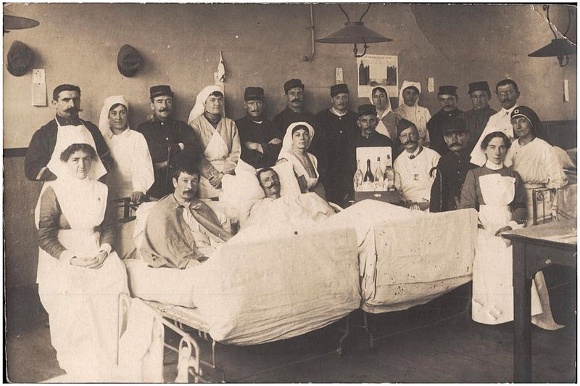Wilfred Owen, selected poems Contents
- Wilfred Owen: Social and political background
- Wilfred Owen: Religious / philosophical context
- Wilfred Owen: Literary context
- Wilfred Owen: 1914
- Wilfred Owen: Anthem for Doomed Youth
- Wilfred Owen: At a Calvary near the Ancre
- Wilfred Owen: Disabled
- Wilfred Owen : Dulce et Decorum Est
- Wilfred Owen: Exposure
- Wilfred Owen: Futility
- Wilfred Owen: Greater Love
- Wilfred Owen: Hospital Barge
- Wilfred Owen: Insensibility
- Wilfred Owen: Inspection
- Wilfred Owen: Le Christianisme
- Wilfred Owen: Mental Cases
- Wilfred Owen: Miners
- Wilfred Owen: S.I.W
- Wilfred Owen: Soldier’s Dream
- Wilfred Owen: Sonnet On Seeing a Piece of Our Heavy Artillery Brought into Action
- Wilfred Owen: Spring Offensive
- Wilfred Owen: Strange Meeting
- Wilfred Owen: The Dead-Beat
- Wilfred Owen: The Last Laugh
- Wilfred Owen: The Letter
- Wilfred Owen: The Parable of the Old Man and the Young
- Wilfred Owen: The Send-Off
- Wilfred Owen: The Sentry
- Wilfred Owen: Wild with All Regrets
Wild with All Regrets - Synopsis and commentary
Synopsis of Wild with All Regrets
 This poem is a monologue addressed to a nearby friend and relates the thoughts and feelings of a man dying of his wounds. He describes his injuries and reflects on how once he and his friend thought it would be dreadful to grow old but now that has been reversed. He asks God to give him just a couple of more years of life.
This poem is a monologue addressed to a nearby friend and relates the thoughts and feelings of a man dying of his wounds. He describes his injuries and reflects on how once he and his friend thought it would be dreadful to grow old but now that has been reversed. He asks God to give him just a couple of more years of life.
The speaker (probably an officer) envies the orderly’s mundane job. He would do that menial task willingly and without a break if it meant he could live. He’d be a chimney sweep or even a flea jumping from the bloodless and the dead to a new body to keep alive. The soldier reflects that he will not be able to find a new body now and addresses his friend, in whom his spirit might live on for a few more hours.
Investigating Wild with All Regrets
- This is one of a group of poems set in hospitals or institutions. How does Owen create setting in this poem?
- Compare Wild with All Regrets with Disabled and Mental Cases
- How does the setting of the poems affect the pity in the poetry?
Commentary on Wild with All Regrets
Context
Wild with All Regrets was written in Dec 1917, just after Owen had been discharged from Craiglockhart. In Owen’s own words to Siegfried Sassoon: ‘I have finished an important poem begun and ended at one gasp.’ Owen also wrote to Sassoon:
In some selections of Owen’s poems Wild With all Regret appears, not as a complete poem but as a fragment. Owen also used it as the basis for another compete poem, Á Terre.
Literary allusions
- Owen makes several literary allusions in Wild with All Regrets. His title is taken from Tennyson’s poem The Princess:
Deep as first love, and wild with all regretThis title is most unusual compared either to more matter-of-fact titles such as The Letter or The Send Off, or to the more reflective but pithy titles, such as Exposure and Futility
Of Death in Life, the days that are no more
The Princess, pt. 4, l.39-40 - In l.12 Owen uses an image of fifty years of life: ‘Your fifty years in store seem none too many’ which is an echo of A.E. Housman’s poem Loveliest of Trees the Cherry Now.
More on: Loveliest of Trees?
- As he contemplates death, the soldier meditates about dust and dirt. It is no surprise he makes that connection given the well-known words of the burial service from the Book of Common Prayer which speak of humans being made of material that will return to its origins:
We therefore commit his body to the ground; earth to earth, ashes to ashes, dust to dust .. (BCP) - The idea of a flea is a reminder of John Donne’s poem The Flea which uses the insignificant creature as an image of a man’s love for a woman (see John Donne: Poem analysis > The Flea). In Wild with All Regrets Owen chooses to use it as a symbol for a man’s love of life.
More on The Flea...: See The Flea by John Donne.
Investigating commentary of Wild with All Regrets
- Owen subtitles Á Terre, which is based on Wild with All Regrets, as ‘being the philosophy of many soldiers’. What is the philosophy of the dying soldier in Wild with All Regrets?
- Remind yourself of Strange Meeting, another poem which demonstrates Owen’s philosophy. Compare the philosophy of the two poems.
